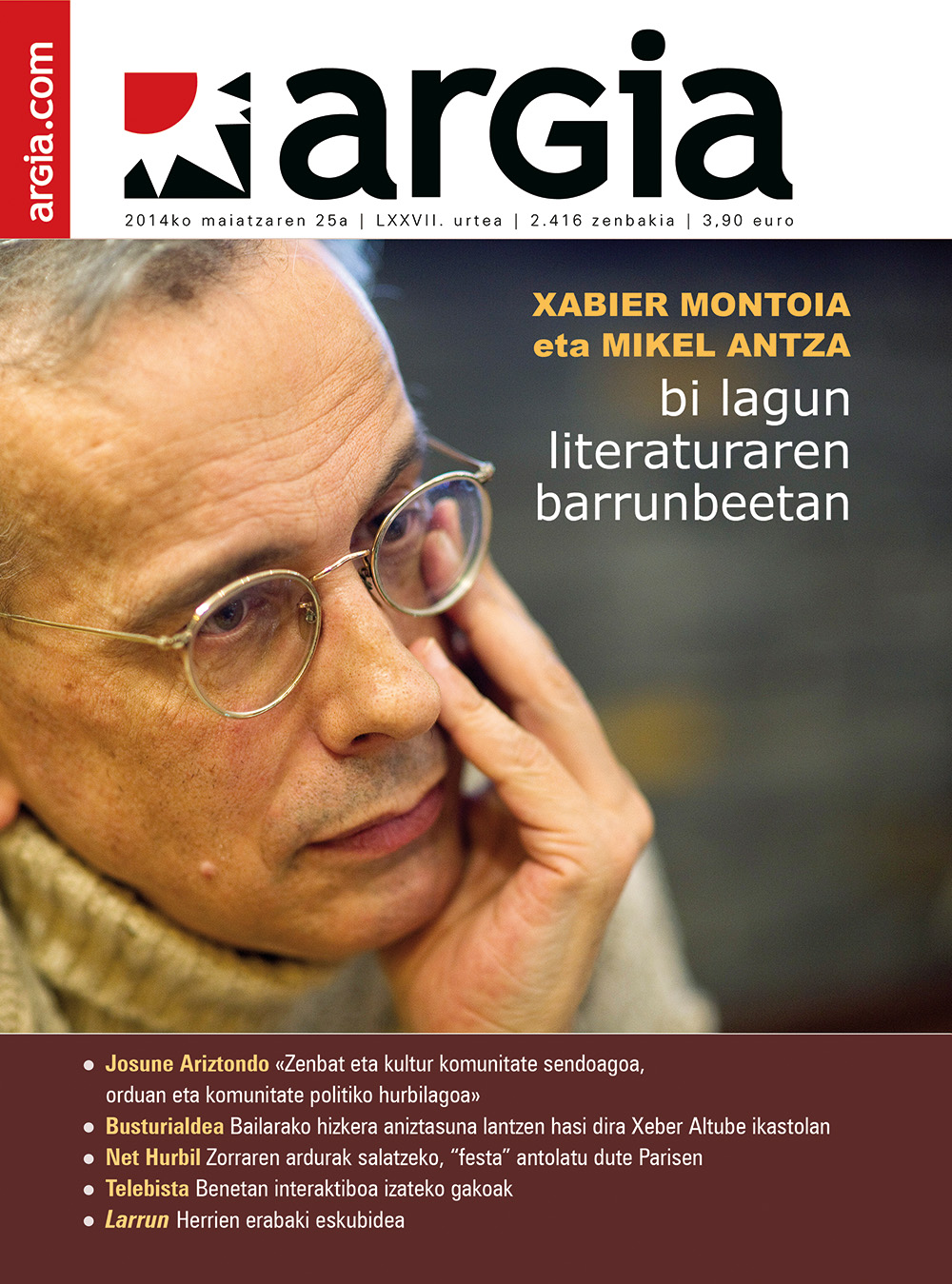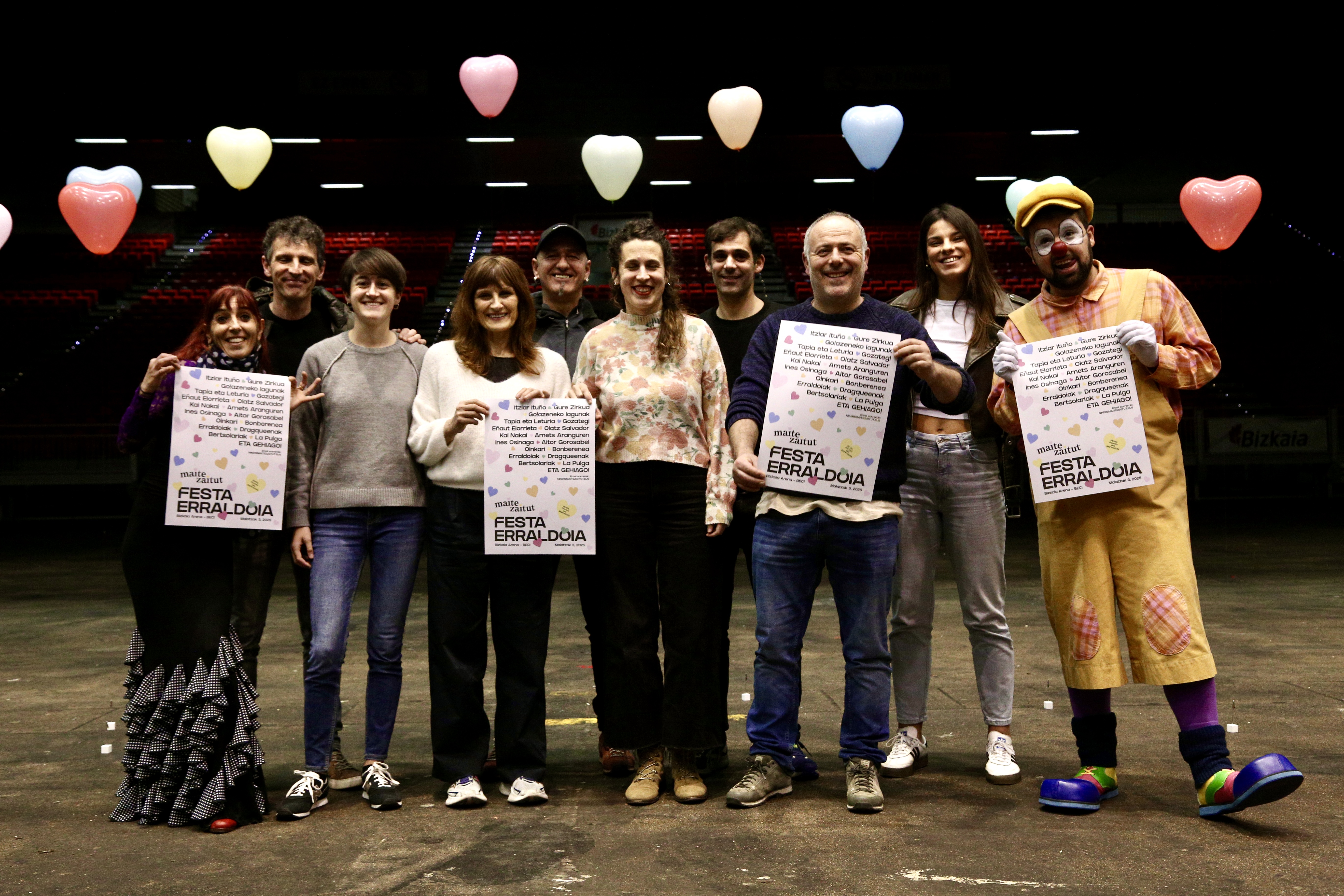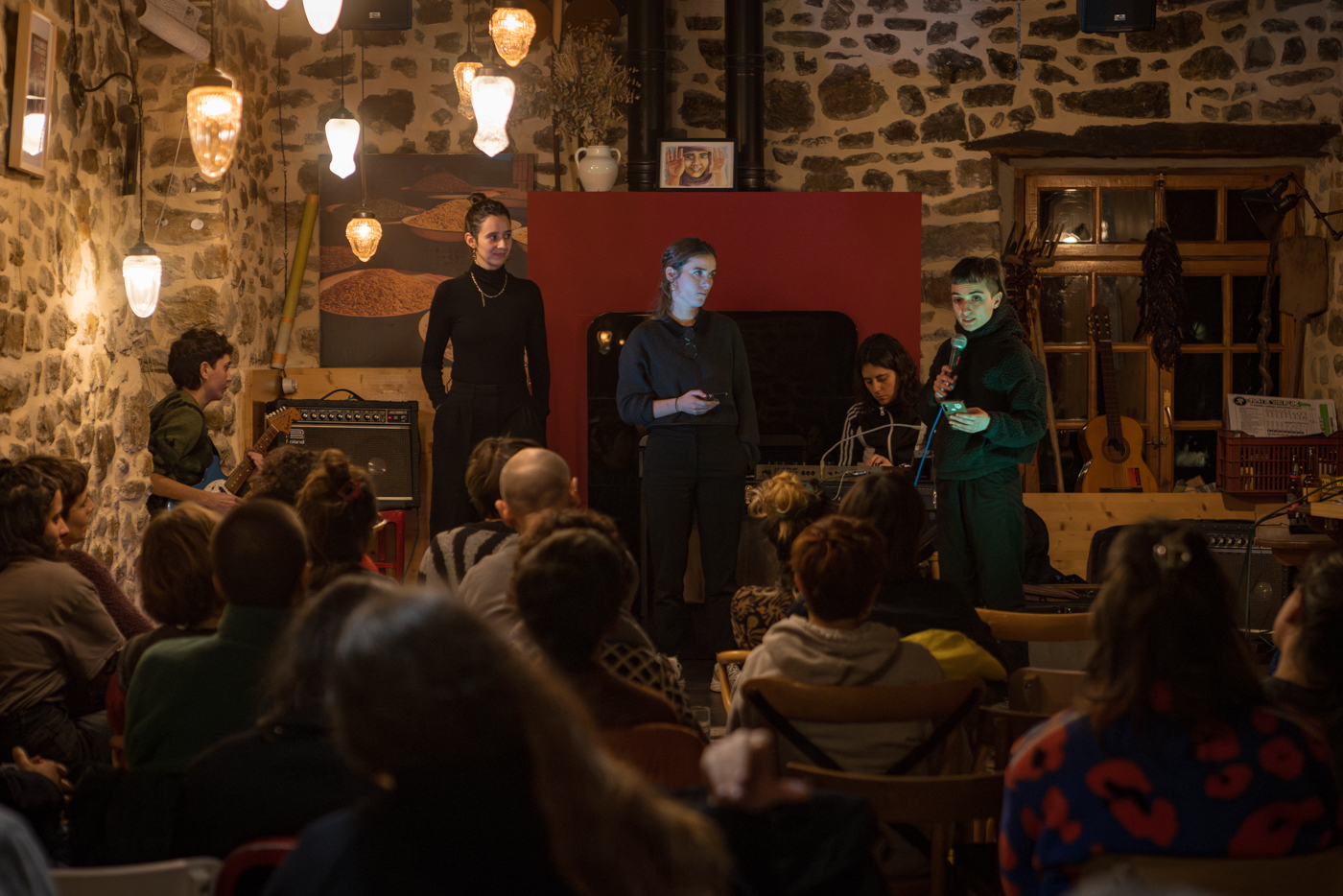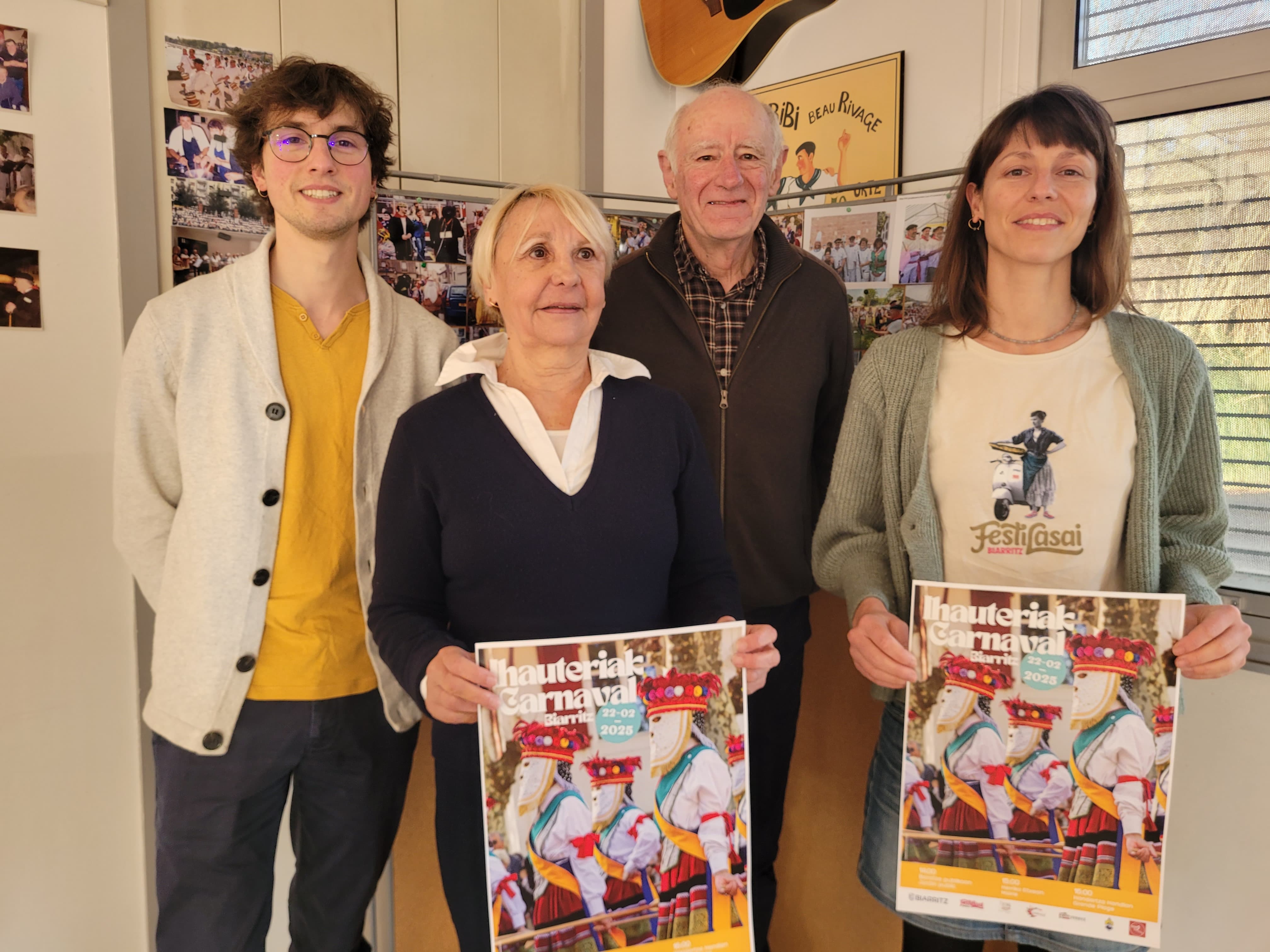"We have to look at what we can be more than what we have been."
- Ondarroa 1948. Bachelor of Chemical Sciences and expert in human resources management. He is a member of the PNV and a Member of Culture of the Provincial Council of Bizkaia. We have brought to the verbalgo, among others, “the private” and “the public” as a dilemma.

“You are in the dilemma of the private and the public. I don't see dilemmas. If the Basques have remained for centuries, it has been thanks to the vitality generated by our society from within. We all have to revive this vitality, and in that the public institutions have a role: we have to get to where social action does not come. For the social initiative to be recognized, action must be taken in the right to equality.” It is the essence of the department of culture of Bizkaia headed by Josune Ariztondo.
We've seen you in the Bizkaia fronton wearing the txapela to the winners of two doubles. Is sport today a culture?
Euskera, youth, culture and sport are my areas. The Basque also. Is that culture? Culture is the set of different expressions of a community or society. We tend to say Basque culture and that is why we differentiate the international from the Basque culture. Sport is culture, but culture is one thing and cultural policy is another. As sports policy works, you can develop, strengthen and unite society, as well as strengthen identity and the Basque sense. Cultural policy is based on the philosophy, ideology and action of each.
It is often a dilemma of the private and the public when it comes to working on cultural policy. Athletic Club (including the new San Mamés) and Bilbao Basket are two of the most prestigious teams. Where is the limit between private and public action in the case of elite sport?
Elite athlete yes or no? Isn't that dilemma? It is true that not always, elite sport professionals make a lot of money, but also those of other cultural elites, and not all. However, no one doubts that the elite of culture must be favored by public institutions. Should we support, yes or no, the literary or musical elite we call culture? We believe that we must analyse and help to the extent of local social and economic situations.
The lines of our policy are school sport and federated sport. That is the main responsibility of the Member. That Bilbao Arena and San Mamés is new... A society is created for the construction of the new San Mamés. Athletic Club does not have any kind of subsidy or financial aid, nor does Bilbao Basket. Another thing is, for example, the case of BEC and Euskalduna infrastructures. Popular initiatives are also used for sport and culture. That said, the benefits of sports elite professionals are excessive, but they are not just athletes. They must therefore be supported in the measures they need. One precision: I'd rather call it the vanguard than the elite. Because, to the extent that they are referents of society, we live by looking at the avant-garde, especially in culture and sport.
How is cultural policy understood?
Culture is a manifestation of the vitality of society and, to a large extent, institutional decision-makers have to listen to coordinate cultural policies and initiatives. In our model, society and institutions go hand in hand. In other models, culture is very private, for example in the United States. There is almost no public protection for those who work in the cultural field. There are tax and other benefits. All of this here is a topic of debate. In other words, here too there are tax incentives, which are very interesting to cultural patrons. But there are also minority cultural areas, which are not bright in the short term, which are hardly accessible to private patrons. Therefore, there is a policy of promotion for them, for example, in the cultural or heritage activity in Basque. Without a policy of public-democratic institutions, it would be unacceptable for these cultural expressions to have an infrastructure and a dignified opportunity.
Can you understand Bilbao and Bizkaia without the Guggenheim Museum?
Would Euskal Herria be understood without the flourishing of the literature we have today? You can understand, but it would be poorer. The same applies to the Guggenheim. The Guggenheim is one of the most important cultural infrastructures in the Basque Country. “Construction brings people” was said at the beginning. The building is sixteen years old, people come, but the Guggenheim, contrary to what they think a lot, has a very important traction. I'd like our publishers to have economic traction. Oxala!
Guggenheim Urdaibai Museum. In other times the Council wanted to do so, but not the Patxi Lopez Government. What is the project?
It is our responsibility to make the projects well known. And indeed, we have had difficulty in explaining that project. In this UNESCO-protected area, different types of companies cannot be installed. OK. However, the preliminary draft was a museum where artists from all over the world performed their works. All the museums here, in their modernity, are classics, we don't see the artists doing their works. In other words, how can they not oppose changes in road infrastructure, such as tunnels, while at the same time opposing a museum or open art space? I never found an answer. However, Patxi López did not stop the construction of the museum, but focused on the study of its viability. The project is standing still, but it is still alive in the Guggenheim strategic plan. The new times will come and the project will be analysed. We shall take into account the questionnaires and opinions of the participating forums.
Can Euskal Herria continue to live, in Basque, if the development of tourism becomes excessive?
Languages don't live in isolation. The Basques are also trying to show those who come here that there is a local culture, a language, in which the Guggenheim is part of that culture. The Guggenheim is living in Basque, those who know Basque have to do so, the offer is also given. On the contrary, the Basque House of Bilbao [in the neighborhood of San Ignacio] brings together a lot of people from exile to learn about our dialects or how the Basque Country evolves. It's the Basque Interpretation Center. We do not live in isolation, nor do we want to live. Tourists are the most widespread in the Basque Country in the world.
These are the words of Jesus Egiguren: “Euskadi, we are making a great Bizkaia.”
Firstly, I do not share the terminology with Egiguren. Bizkaia is our historical territory. Euskadi is Zazpiak Bat, the CAV, a political community, with three of the seven. Euskal Herria is our cultural nation of the seven territories. Euskadi is a political nation with seven territories, which I hope one day to see a unity.
“More Euskadi than Euskal Herria,” he added.
No, the other way around. The more the Basque Country is Euskadi, the stronger the cultural community (for me Basque Country) the closer the political community is. There are organizations working on the development of this community. Euskaltzaindia or Eusko Ikaskuntza, for example. To mention the big ones (including the Light). In its creation, the intention of the four Members was to keep this cultural community alive. The dream of some, not all, was to form a political community. For me, that's called the Basque Country.
“The rich of Bizkaia love money,” Gabriel Aresti said. In addition, Biscayan nationalism has a rather obtuse Basque.
Nationalism was born in Bilbao as a political movement. The creator [Sabino Arana] learned Basque and his followers too. Many of them were not Basque. José Antonio Agirre [Lehendakari] did not receive Euskera at home. It is true what Gabriel Aresti said. In Bilbao and the surrounding area there was a very important bourgeoisie around capitalism, which was never a lover of the Basque Country, which played against the Abertzales; an exception of the Sota family. But Bilbao is more than that. It's the seven streets. Or the Basque waves that we came from Bizkaia in a time, which we have taken root in Bilbao. Bilbao is also a working people, with all its darkness and its lights a reference for the Biscayan people. The Biscayan loved Bilbao, although when we came here (many years ago) we had to hear mockery about our melody. Those of the fishing village have always been noisy, the baserritars, more feeble, were going backwards. Bilbao has been our reference because the house of Sabino Arana was here, because the Outings of Bizkaia have been very important. Bilbao, Gernika, etc. They were places of resistance in Bizkaia. They all make our history and Bilbao.
“We will be saved or we will not be saved in Bilbao,” Ramón Saizarbitoria said last year.
This has its literary symbolism. They laugh at us when we say the great Bilbao. If you take the metro, in its extension we live here half of those of us who live in the Basque Country. Will we save ourselves?
If Bilbao is euskalduniza, that is to say.
Listen, we're doing it. Bilbao is the city with the most Euskaldunes. Density is our problem. An Euskaltzale journalist came to Bilbao and said, astonished: “In front of football fans I’ve seen the fashion show in Basque.” Bilbao has evolved in many ways, both in the presence of the Basque Country and in prestige. The Basques are not few in Bilbao, we have shown who we can be in the city, living in Basque in many areas. That has encouraged a lot of people to get used to it. And those who haven't been able to themselves, at least, their son's. In order to gain access to culture, Euskera is fundamental, and this has been achieved by those who did not receive Euskera at home, those who did not speak in Euskera. That has been in Bilbao and in the Basque Country as well. Thank you, among other things, to the ikastolas.
Another dilemma: Is Bilbao the capital of the Basque Country? Will it be Pamplona?
Bizkaia and Navarra... In Euskal Herria, even when we have had the greatest freedom to define ourselves, our reality has been confederal. We have never been the only institution that has ruled the entire Basque country. In other words, the culture of the confederation is highly internalized in our country, and that does not detract from the fact that we all concentrate, or that we work together, or that we have a single command. But let's not do it, all zero and one alone. When we talk about nationalism, we should look at what we can be more than what we have been. Let us not follow the model of the Jacobin nations, for example.
What are the biggest obstacles to consolidating the “Basque culture”? To live in the world as a Basque, to be among other cultures?
You can become an obstacle option. We have the problems and opportunities that the youngest have. The big one picks the little one, but the little one slips under his feet. The little one goes through all the holes, the big one almost doesn't. That is the challenge. The challenge is to turn obstacles into opportunities. It's not in vain that they know us as little as they are. Starting with our rapacious whales, we've left our mark on the world. We have to follow that path, looking at the world, looking at our family, not forgetting who we are, and assimilating what comes to us from the world. There's football, which comes from outside. Bilbao is a witness and an example of this. We also have the ball, which we have brought out into the world.
A conference for architects has just been held in Madrid to discuss the crisis of the professional architect. They have distinguished the traditional and contemporary way of being an architect. What is traditional? From the epic architect who appears in The Brutalist, where... [+]
Istorioetan murgildu eta munduak eraikitzea gustuko du Iosune de Goñi García argazkilari, idazle eta itzultzaileak (Burlata, Nafarroa, 1993). Zaurietatik, gorputzetik eta minetik sortzen du askotan. Desgaitua eta gaixo kronikoa da, eta artea erabiltzen du... [+]
In 2021 we began to hear the first echoes of the Guggenheim Urdaibai project. The then General Manager Unai Rementeria told us that it would be done yes or yes. To reinforce his claims, he left 40 million euros “shielded” by the time the museums were built. There it is!... [+]
Things aren’t easy in fact, and it will be for one reason or another, but lately I’ve bitten my tongue more than I should for these two things: the culture of the sold out and the FOMO – the latter perhaps has to be explained, because it’s not said so many times: the... [+]
Ultra
La Furia
Baga Biga, 2024
---------------------------------------------------------
Cascanteko La Furia-k bosgarren diskoa plazara atera du. Mimoz eta erraietatik, berarentzat funtsezkoak diren osagai horiekin, prestatu du honako pozima, pozoitsua eta aldi berean... [+]
When the dragon swallowed the
sun Aksinja Kermauner
Alberdania, 2024
-------------------------------------------------------
Dozens of books have been written by Slovenian writer Aksinja Kermauner. This is the first published in Basque, translated by Patxi Zubizarreta... [+]
EMEADEDEI + MAHL KOBAT
WHEN: February 2nd.
IN WHICH: In the youth center of Zuia, Murguía.
----------------------------------------------------
On September 20 of last year, we first heard about collective music in the profile of the social network they had just created:... [+]























